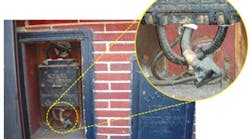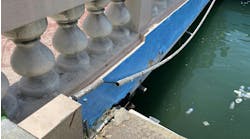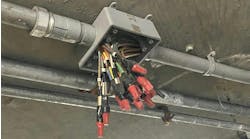How well do you know the Code? Think you can spot violations the original installer either ignored or couldn't identify? Here's your chance to moonlight as an electrical inspector and second-guess someone else's work from the safety of your living room or office. Joe Tedesco, who has a knack for finding shoddy electrical work, did the dirty work and found this mess. Now it's your turn to identify the violation.
Find the Answer
Answer:
This is a main disconnect switch for a building I ran across in the Boston area. Many of these are still in use in this part of the country. Although the Code isn't retroactive, the following references could be cited if this installation was inspected in accordance with the latest edition of the NEC.
Tony Scaffidi, technical support engineer, Pieper Electric, Milwaukee, sent in these comments. “This is a fused disconnect. The small lever in the middle of the enclosure engages the fuses and either opens or closes the switch when turned. It looks like the grounded conductor is being tapped, which is a direct violation of 404.3(B). If this was a service disconnect, you would be disconnecting the neutral and service grounding.”
Albert Howitt, electrician, Bonte Electrical, Houston, had this to say. “The enclosure raceway is missing an insulated fitting. This would be required if we were to reference the current edition of the Code, as per 300.4(F). The tap conductor connection could also be a violation of 110.14(A), and the installation might also violate the tap conductor requirements of 240.21 (A) through (G).”
Mike Svasta, electrical designer, Peters, Tschantz & Bandwen, Inc., Akron, Ohio, added this to the mix. “The equipment, with its missing cover, could possibly lead to a shock hazard, since it's located so close to the public street. One way to overcome this hazard would be to replace the main switch shown here with a new one located in the basement of the building.



